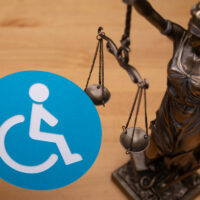Can Employers Ask For Proof of Disability?

Disability discrimination in the workplace is unlawful under both state and federal law. Covered employers must not only disregard considerations of a qualified employee’s disability when making employment decisions; they must also provide reasonable accommodations for employees with a new or preexisting disability. If you ask for reasonable accommodation, however, and your employer does not believe you actually need the accommodation, can they ask for proof of your medical condition? Is asking about your disability a form of discrimination? Read on to learn about workplace disability discrimination in California, and if you’ve been discriminated against at your job, call our Orange County disability discrimination attorney for trusted advice and representation.
Employer Duties to Disabled Employees
Employers must not discriminate against employees with a disability. Employers cannot ask prospective employees about a disability or require applicants to take a medical examination; at most, they can ask whether the employee is qualified to perform the job and physically able to do so. Employees cannot discriminate against disabled individuals when considering whom to hire, fire, or promote, and they cannot treat disabled employees differently in terms of compensation or other benefits simply as a result of their condition.
Additionally, employers must offer reasonable accommodation for employees with a disability who are otherwise qualified and able to perform their job duties.
What is Reasonable Accommodation?
Under California and federal law, employees are required to make reasonable accommodations for employees with a disability. A reasonable accommodation is a change or adjustment to the work environment or the job that allows an otherwise qualified employee to perform the essential functions of their job or enjoy the benefits and privileges of employment that other employees receive. Employers must provide a reasonable accommodation unless they can show that doing so would constitute an undue hardship–i.e., that it would require significant difficulty or expense (such as altering the foundations of the office space).
Reasonable accommodation can take many forms based on the needs of the employee, including:
- Additional or extended break times
- Modification to work equipment or devices (e.g., adding a wheelchair ramp or handrails)
- Restructuring the employee’s job duties
- Reassignment to a vacant position
- Allowance for medical visits
- Providing readers or interpreters
- Part-time or modified work schedule
- Adjustment to training, policies, or examinations
Employers Can Ask for Proof of Non-Obvious Disability
Typically, employers will not ask for proof of a disability. If an employee is clearly injured or has an obvious disability such as paraplegia, partial or complete blindness, or other physical ailments, employers will generally accept the employee’s request for a reasonable accommodation without the need for further proof.
However, if you suffer from a non-obvious disability and request a reasonable accommodation, your employer can request medical proof in order to justify the cost or trouble. For example, if you were in a serious car accident and you now suffer from post-traumatic stress disorder (PTSD), your employer might ask for proof of your diagnosis to justify changes to your schedule or position. Employees are protected from discrimination based on mental health conditions as well as physical conditions, but they can be more challenging to prove as they are not physically apparent.
If your employer requests proof of your disability and you fail to provide medical documentation, your employer has the right to deny your accommodation request. If you provide proof, however, your employer is required to make reasonable allowances to give you the tools necessary to do your job.
If you are an employee with a discrimination claim, a wage & hour dispute, a retaliation matter, or other employee rights issues in Orange, Riverside, San Bernardino, Los Angeles, or San Diego counties, or if you are a California employer dealing with employee rights allegations, wage & hour issues, employee contract disputes, or other employment law issues, contact a diligent and successful California employment law attorney at Coast Employment Law at 714-551-9930 for a free consultation.
